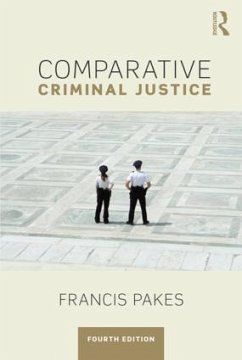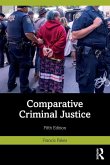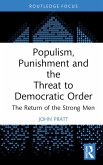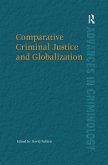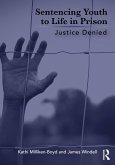This book offers a scholarly introduction to comparative criminal justice. It examines and reflects on the ways different countries and jurisdictions deal with the main stages in the criminal justice process, from policing, to systems of trial, to sentencing, and punishment. This popular bestseller has been fully updated and expanded for the fourth edition.
This textbook provides the reader with:
a comparative perspective on criminal justice and its main components
a knowledge of methodology for comparative research and analysis
a discussion of global trends such as the global drop in crime, the punitive turn, penal populism, privatization, international policing and international criminal tribunals
an understanding of the emerging concepts in comparative criminal justice, such as security, surveillance, crimmigration and penal exceptionalism
a global and historical considerationof the death penalty and international criminal justice
increased attention to environmental crime, genocide and policy brutality.
The new edition has been fully updated to keep abreast with this growing field of study and research, to include a broader coverage of judicial decision makers; a new chapter on the death penalty in comparative perspective; and further coverage of key topics such as global policing and electronic monitoring, and new insights into measuring and understanding crime and punishment globally.
In this book, lists of further reading, study questions and boxed case studies help bring comparative criminal justice alive for students and instructors alike. This book is perfect reading for advanced undergraduates and postgraduates taking courses in comparative criminal justice and those who are engaged in the study of global responses to crime.
This textbook provides the reader with:
a comparative perspective on criminal justice and its main components
a knowledge of methodology for comparative research and analysis
a discussion of global trends such as the global drop in crime, the punitive turn, penal populism, privatization, international policing and international criminal tribunals
an understanding of the emerging concepts in comparative criminal justice, such as security, surveillance, crimmigration and penal exceptionalism
a global and historical considerationof the death penalty and international criminal justice
increased attention to environmental crime, genocide and policy brutality.
The new edition has been fully updated to keep abreast with this growing field of study and research, to include a broader coverage of judicial decision makers; a new chapter on the death penalty in comparative perspective; and further coverage of key topics such as global policing and electronic monitoring, and new insights into measuring and understanding crime and punishment globally.
In this book, lists of further reading, study questions and boxed case studies help bring comparative criminal justice alive for students and instructors alike. This book is perfect reading for advanced undergraduates and postgraduates taking courses in comparative criminal justice and those who are engaged in the study of global responses to crime.
"A comprehensive and well-written text about criminal justice around the world. Broad and thematic in its approach, highlighting diversity of criminal justice systems, with a critical eye towards learning from others and changing criminal justice for the better."
Helgi Gunnlaugsson, Professor of Criminology, University of Iceland
"Comparative scholarship in criminology and criminal justice is of great and arguably growing importance. The new edition of Frances Pakes' excellent book takes the reader through all the main issues in the field and illustrates the arguments with thoughtful use of contemporary research. A must read for all academics and students interested in the subject."
Tim Newburn, Professor of Criminology and Social Policy, London School of Economics
"In Comparative Criminal Justice, Fourth Edition, the author contextualizes comparative criminal justice for an increasingly globalized world. Rather than opting for a country case study approach, Pakes introduces comparative study thematically, including discussions of methods and theory. The author also moves beyond the narrow discussion of substantive differences in conventional crime found in many comparative texts by exploring the diversity in procedural arrangements in theory and practice across the world. One of the primary strengths of the textbook for undergraduate students is a critical examination of the role of the state apparatus in criminal justice arrangements. An additional strength of this comparative text over others is the inclusion of contemporary global issues such as environmental crime and international justice mechanisms. The organization of the textbook lends itself to a thorough, but concise, exploration of all the key themes in comparative criminal justice and is suitable for undergraduates at all levels."
Taimi Castle, Associate Professor of Justice Studies, James Madison University
"Loyal readers of Francis Pakes' Comparative Criminal Justice have been eagerly awaiting this edition. The new text builds on the strengths of previous versions, while updating and reflecting in new ways on many important issues. The book is ideal for instructors in advanced undergraduate courses seeking to introduce students to criminal justice outside their home countries."
Matthew Light, Associate Professor of Criminology, University of Toronto
"Pakes' Comparative Criminal Justice has become a classic in comparative criminology by now. With new chapters on the death penalty and green criminology, this fourth edition will again motivate students of different levels to cross all possible borders."
Miranda Boone, Professor of Criminology and Comparative Penology, Leiden University
Helgi Gunnlaugsson, Professor of Criminology, University of Iceland
"Comparative scholarship in criminology and criminal justice is of great and arguably growing importance. The new edition of Frances Pakes' excellent book takes the reader through all the main issues in the field and illustrates the arguments with thoughtful use of contemporary research. A must read for all academics and students interested in the subject."
Tim Newburn, Professor of Criminology and Social Policy, London School of Economics
"In Comparative Criminal Justice, Fourth Edition, the author contextualizes comparative criminal justice for an increasingly globalized world. Rather than opting for a country case study approach, Pakes introduces comparative study thematically, including discussions of methods and theory. The author also moves beyond the narrow discussion of substantive differences in conventional crime found in many comparative texts by exploring the diversity in procedural arrangements in theory and practice across the world. One of the primary strengths of the textbook for undergraduate students is a critical examination of the role of the state apparatus in criminal justice arrangements. An additional strength of this comparative text over others is the inclusion of contemporary global issues such as environmental crime and international justice mechanisms. The organization of the textbook lends itself to a thorough, but concise, exploration of all the key themes in comparative criminal justice and is suitable for undergraduates at all levels."
Taimi Castle, Associate Professor of Justice Studies, James Madison University
"Loyal readers of Francis Pakes' Comparative Criminal Justice have been eagerly awaiting this edition. The new text builds on the strengths of previous versions, while updating and reflecting in new ways on many important issues. The book is ideal for instructors in advanced undergraduate courses seeking to introduce students to criminal justice outside their home countries."
Matthew Light, Associate Professor of Criminology, University of Toronto
"Pakes' Comparative Criminal Justice has become a classic in comparative criminology by now. With new chapters on the death penalty and green criminology, this fourth edition will again motivate students of different levels to cross all possible borders."
Miranda Boone, Professor of Criminology and Comparative Penology, Leiden University

